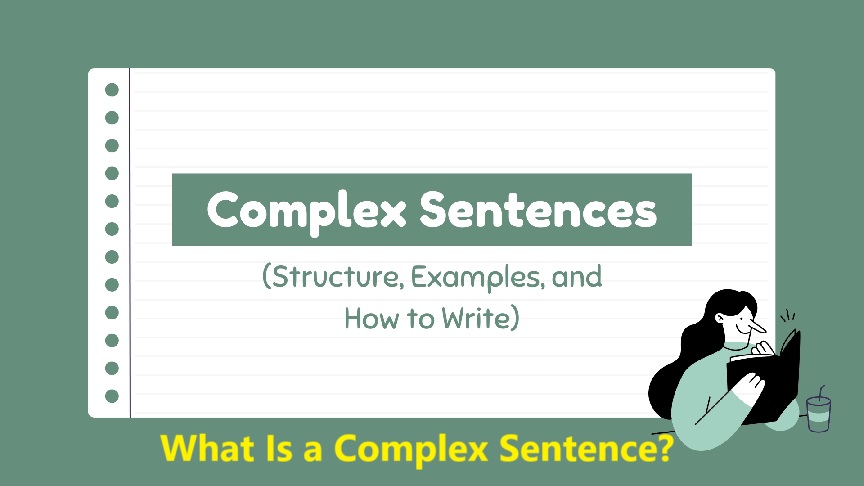
Understanding sentence structures is key to effective communication. Among the various types of sentences, the complex sentence plays an essential role. But what exactly is a complex, and how can it make your writing more compelling? Let’s dive into this question in detail.
Introduction to Complex Sentences
If you’ve ever been told that your writing feels choppy or disconnected, you may have been using too many simple sentences. To make your writing flow better, you need to understand different sentence structures. One powerful tool is the complex sentence. Complex are like the glue that holds ideas together, making your writing more cohesive and engaging. Let’s explore how they work and why they matter.
The Basic Definition of a Complex Sentence
So, what exactly is a complex sentence? Simply put, a complex contains one independent clause and at least one dependent clause. The independent clause can stand on its own as a complete sentence, while the dependent clause relies on the main clause to make sense.
For example:
“Although it was raining, we decided to go for a walk.”
In this sentence, “we decided to go for a walk” is the independent clause, and “Although it was raining” is the dependent clause. The dependent clause cannot stand alone as a full sentence.
Components of a Complex Sentence
A complex sentence has two key parts:
- Independent Clause: This part could be a sentence by itself.
- Dependent Clause: This part, while it contains a subject and verb, cannot stand alone.
These clauses are often linked by subordinating conjunctions like because, although, since, and when.
Independent vs. Dependent Clauses
Understanding the difference between independent and dependent clauses is crucial for writing complex sentences. An independent clause is like a person who can stand on their own two feet, while a dependent clause is like someone who needs support.
Independent Clause
Example:
“She enjoys reading.”
This is a complete thought that can stand alone.
Dependent Clause
Example:
“Although she enjoys reading…”
This is an incomplete thought and leaves you wanting more information.
Why Use Complex Sentences?
You might be wondering, why go through the trouble of using complex sentences? Here’s why:
- Improved Clarity: They allow you to express more detailed thoughts in a single sentence.
- Engagement: Complex hold the reader’s attention longer, making your writing more engaging.
- Flow: They make your writing flow more smoothly by connecting ideas logically.
How to Write a Complex Sentence
Creating a complex sentence isn’t hard, but it does take some practice. Here’s a quick step-by-step guide:
- Start with an Independent Clause: This is your main idea.
- Add a Dependent Clause: Use a subordinating conjunction to introduce the dependent clause.
- Check for Completeness: Ensure the sentence makes sense and that the dependent clause cannot stand on its own.
Example:
“Because she was late, the meeting started without her.”
Examples of Complex Sentences
Let’s look at a few examples to better understand how complex sentences work in different contexts:
- “Even though I was tired, I stayed up late to finish the project.”
- “Since you didn’t call, we assumed you were busy.”
Each of these examples includes both an independent clause and a dependent clause, connected by a subordinating conjunction.
Common Mistakes with Complex Sentences
Writers sometimes fall into traps when trying to create complex. Here are a few mistakes to avoid:
- Comma Splices: Don’t just use a comma to connect two independent clauses. Use a subordinating conjunction instead.
- Fragmented Sentences: Ensure your dependent clause is connected to an independent clause. Otherwise, it’s just a fragment.
Complex Sentences vs. Compound Sentences
People often confuse complex sentences with compound sentences. While both contain more than one clause, there’s a difference.
- Complex Sentence: One independent clause and one or more dependent clauses.
- Compound Sentence: Two or more independent clauses joined by a coordinating conjunction like and, but, or or.
Example of a compound sentence:
“I wanted to go for a walk, but it started raining.”
Punctuation in Complex Sentences
Punctuation can make or break your complex sentence. Here are a few rules to keep in mind:
- Dependent Clause First: If your sentence starts with a dependent clause, use a comma before the independent clause.
- Independent Clause First: No comma is needed if the independent clause comes first.
Example:
- “Because it was raining, we canceled the trip.” (Dependent clause first)
- “We canceled the trip because it was raining.” (Independent clause first)
The Role of Subordinating Conjunctions
Subordinating conjunctions are the backbone of complex. These words link your dependent and independent clauses, giving meaning to the dependent clause.
Common subordinating conjunctions include:
- Because
- Although
- Since
- When
- If
How Complex Sentences Enhance Writing
Using complex can make your writing more sophisticated and nuanced. Instead of stating simple, disconnected ideas, you can layer information, show relationships, and create a more engaging narrative.
Think of complex sentences like multi-layered cakes. A simple sentence is a single layer of cake—satisfying but basic. A complex, on the other hand, adds layers of flavour and complexity, making it far more interesting.
Teaching Complex Sentences to Learners
Teaching complex can be a bit tricky, especially for new writers. The key is to start with simple examples and gradually build up to more complex ones. Use plenty of practice sentences and encourage learners to identify independent and dependent clauses in their writing.
Conclusion: Mastering Complex Sentences
Mastering the use of complex is a valuable skill that can dramatically improve your writing. Whether you’re aiming for clarity, engagement, or flow, complex are an essential tool in your writing toolkit. With a little practice, you’ll find yourself using them effortlessly, making your writing more dynamic and effective.
FAQs
1. What is the difference between a complex and a compound sentence?
A complex contains one independent clause and at least one dependent clause, while a compound sentence has two or more independent clauses joined by coordinating conjunctions.
2. Can a sentence be both complex and compound?
Yes, a sentence can be both complex and compound. Such sentences contain two or more independent clauses and at least one dependent clause.
3. How do I know if a sentence is complex?
If the sentence has one independent clause and at least one dependent clause connected by a subordinating conjunction, it’s complex.
4. Do complexes need commas?
It depends on the structure. If the dependent clause comes first, a comma is required. If the independent clause comes first, no comma is needed.
5. Why are complexes important?
They add depth and variety to your writing, helping to connect ideas more smoothly and making the text more engaging for readers.
Read More: Complex Magazines

